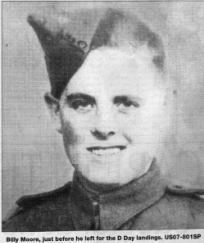VETERAN RECALLS D DAY LANDINGS
 BILLY
Moore was honoured to perform the official duties when he
opened the Royal British Legion's new lounge last week.
BILLY
Moore was honoured to perform the official duties when he
opened the Royal British Legion's new lounge last week.
However, the Royal British Legion were equally as honoured to have their esteemed member with them for the night.
Billy, at the age of just 18, joined the Allied war effort when he enlisted in the Young Soldiers 70th Battalion Royal Ulster Rifles, before being sent to join the Second Battalion Royal Ulster Rifles to train in Scotland for the D Day landings.
"When we finished training we all went to a camp in England. We weren't allowed out for a month until D Day came," said Billy.
Billy travelled to France for the D Day landings, before landing near Swords Beach and fighting his way through to Belgium, facing the horror of war and loosing many friends along the way.
"On D Day we were taken onto the ships and onto landing craft. We went around France for a day because it was too rough to land.
"We had bicycles with us because they thought we were just going to walk into Cambes. They thought it would be easy.
"The sea was so rough that we threw the bicycles overboard and you could see bodies floating in the water," recalls Billy.
"We landed half a mile from Swords beach. We had no idea what it was going to be like. We were met with tanks and machine gun fire; they hit us with everything. We didn't think there would be so much against us. "I saw lads younger than me laying dead in the field with their kit around them. You would have thought they were sleeping.
"There were about 180 of us lost and something like eleven officers.
"We were the first battalion in, we led the way to Cambes with 400 bombers bombing us.
"As we went towards Tirowen we came up against German tanks and another 80 men were killed. We lost a lot of boys. We got it very rough there.
"You didn't know who you were fighting with. Men were just getting knocked down and replaced all the time.
"We travelled for another 250 miles to the River Seine and we had to create a bridge for the people coming after us. We were leading the way.
"There was street fighting and mortar bombs were dropped on us. "I remember about five of us standing on top of a trench having a smoke when we heard the planes overhead. We dived into the trench but one of the men didn't make it. "I had a lot of mates killed and one of the mortars knocked me out of action."
Billy was taken in a field ambulance and transferred to Queen Elizabeth Hospital in Birmingham for a series of operations on his leg. He stayed in hospital for seven months and never went back to the front line.
But before he was wounded in action, Billy was remembered by Lieutenant Cyril Rand in his regimental journal for bringing much-needed comfort to the troops. Before a patrol, which was led by Lieutenant Rand, Billy reached into his pocket and pulled out a testament that had been given out before the D Day landings.
He read extracts to the men just before they left on patrol. Everyone thanked him and Lieutenant Rand recalled: "At first the episode struck me as rather incongruous: these soldiers, some of whom had a reputation for hard drinking and pay day brawling, who had probably only seen the inside of a church on church parades, had obviously been quite moved.
"I also said thank you to Rifleman Moore and like the members of my patrol I meant it."

